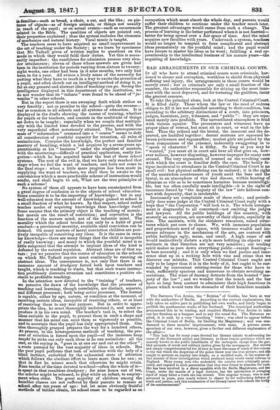The Baroness Von Arnim, the " Bettina " of Goethe,
has been at war with the authorities of Berlin. According to the current explanations, the lady takes an active part in publishing her own works, and lately began to publish the posthumous works of her husband. The municipal authorities pronounced this to be trading, and required Madame Von Arnim to take out her freedom as a burgess and to pay the usual fee. The Baroness re- plied, it is said, by a very "insulting ' letter-' was cited to appear before the Criminal Court of Berlin, for libelling the Magistracy; and was con- demned to three months' imprisonment, with costs. A private corre- spondent of our own, however, gives a further and different explanation of the affair- " This lady has for many years devoted her literary talents to advocating the cause of the distressed artisan and labourer, in those remote provinces which are scarcely known to the public inhabitants of the metropolis except from the gar- bled accounts of revolt and military justice given by the news pipers. Her shrewd and simple comprehension led her at once to trace the cause of much of this misery to the veil which the despotism of the police throw over the true picture; and she sought to promote an inquiry into details, on a modified scale, in the matter-of- fact manner of those investigations which produced many recent social reforms in England. Many young men who undertook the mission were criminally prose- cuted, and exposed to such persecution that they were forced to abandon the task. She has been involved in a direct squabble with the Berlin Magistrates, arid the Court, under the mantle of a legal decision, has the satisfaction of avenging itself of many bitter a truth she has uttered. This singular woman, who is now advanced in years, pots manly writers to shame by her unflinching defence of troth and justice; and this termination of her literary career will redeem the Wit, of its commencement.'


























 Previous page
Previous page